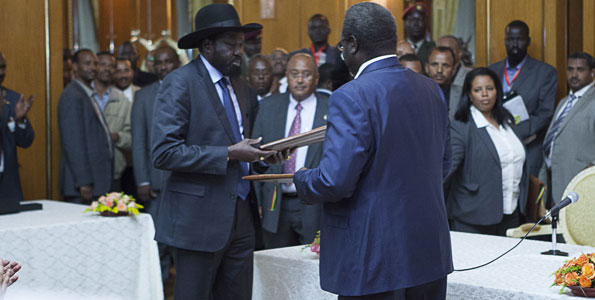Nairobi (The East African) – South Sudan’s rival forces have made little if any progress at talks on ending the country’s civil war, the government has warned, despite intense international pressure for a deal ahead of an August 17 deadline.

Tens of thousands of people have been killed in almost 20 months of war, which has been marked by widespread atrocities on both sides.
“There are some outstanding areas where, if we don’t agree, we don’t need to deceive ourselves and talk of peace,” Minister of Information Michael Makuei told reporters late Wednesday, after a week of talks in Ethiopia.
South Sudan’s civil war began in December 2013 when President Salva Kiir accused his former deputy Riek Machar of planning a coup, setting off a cycle of retaliatory killings that has split the poverty-stricken, landlocked country along ethnic lines.
Key issues of disagreement include a power-sharing proposal between the government and rebels, part of a peace plan put forward by the regional eight-nation bloc IGAD, the Intergovernmental Authority on Development, as well as the United Nations, African Union, China and the “troika” of Britain, Norway and the United States.
On Tuesday, top rebel generals said they had split from Machar, and while the government said they had not received any official confirmation, Makuei warned it could complicate peace efforts.
“If what they have declared is true, and they have taken over the leadership of their movement, then definitely we will have to negotiate with whoever is in power,” said Makuei, who is leading the government delegation at the talks.
Mediators, backed by US President Barack Obama during his recent visit to Ethiopia, have given Kiir and Machar until Monday to halt the civil war.
Diplomats say the rivals are under intense pressure to sign a deal, since failure to do so could lead to a range of punitive measures, including an arms embargo and targeted sanctions.
But they remain far apart on power sharing and security, including the proposed demilitarisation of the capital Juba, Makuei said.
Those issues would now be put before Kiir and Machar, who are expected to meet soon in Addis Ababa, he said, without giving a date for the meeting.
“Mediators are to make the necessary preparations for the principals to come and meet, and probably discuss and agree on these outstanding issues,” he said.
List of broken deals
As international pressure grows ahead of an August 17 deadline to strike a deal at peace talks in Ethiopia, here is a list of the key agreements between President Salva Kiir and rebel leader Riek Machar.
January 23: Celebrations as Kiir and Machar sign their first ceasefire, agreed in Ethiopia and mediated by east Africa’s eight-member IGAD bloc. It is broken shortly after.
May 9: Kiir and Machar pray together, as mediators in Addis Ababa hail a deal “ending the war.”
August 25: Amid IGAD sanction warnings, Kiir and Machar ink another ceasefire in Addis Ababa, along with a deal to forge a unity government within 45 days.
October 20: In the Tanzanian town of Arusha, Kiir and Machar accept “collective responsibility” for the war, and call again for peace.
November 8: An “unconditional, complete and immediate end to all hostilities” is agreed by the rivals in Addis Ababa. It lasts a few hours.
2015
January 21: Kiir and Machar promise to make a “public apology” for the war and recommit to a ceasefire.
February 1: Another ceasefire commitment, and a deadline set of March 5 to agree a final peace deal and establish a transitional government.
June 27: Kiir and Machar meet for five hours in Kenya, but sign no deal.
August 6: Talks resume in Addis Ababa, ahead of an August 17 deadline. Fighting continues.
Source: The East African


Leave a Reply